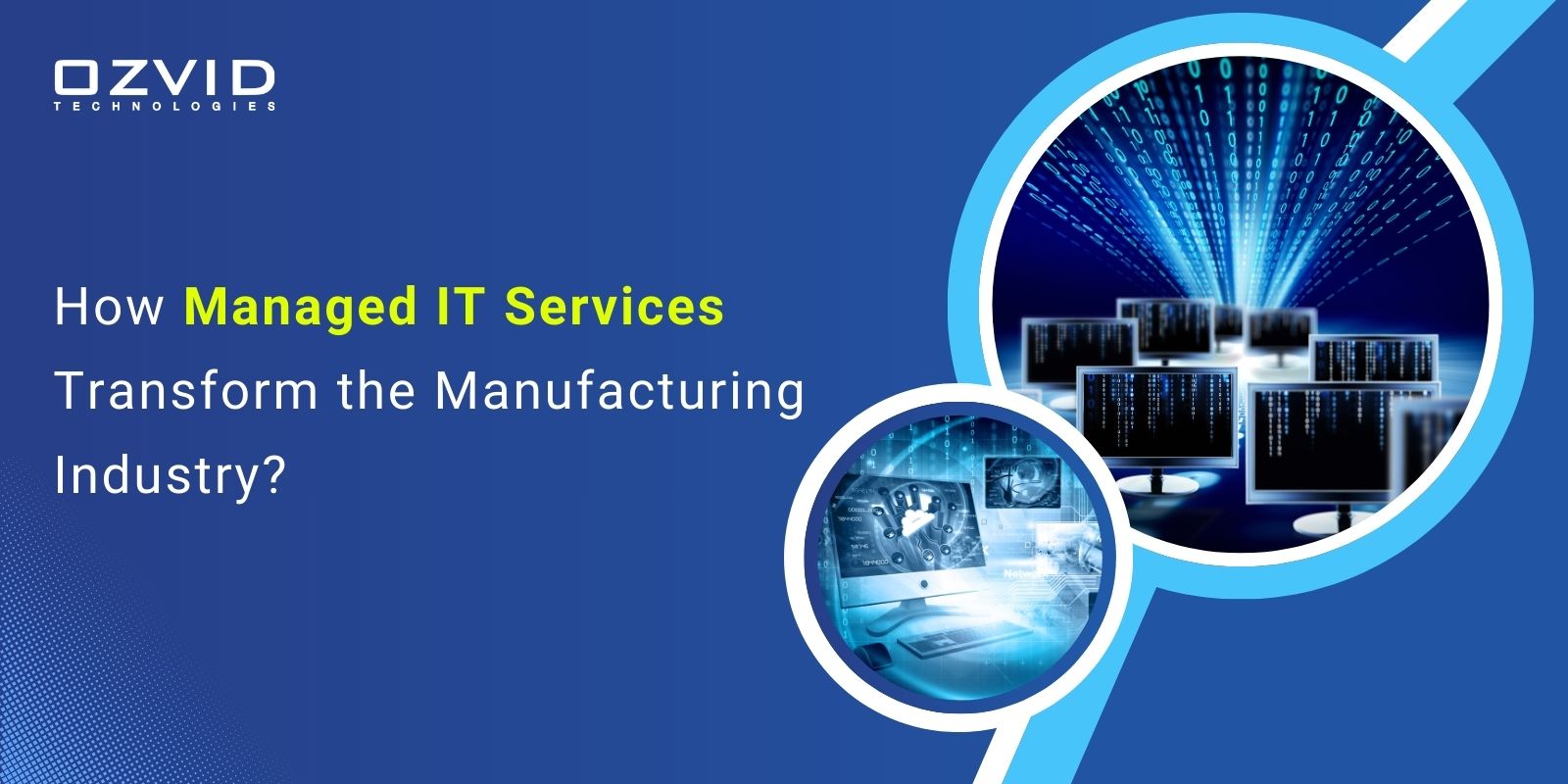- Sep 12, 2025
Share this post on:

As the manufacturing sector continues to evolve with Industry 4.0, the need for robust, secure, and scalable IT infrastructure has never been more critical. From automation to AI-driven insights, manufacturing companies are rapidly embracing digital transformation to enhance productivity, reduce costs, and stay competitive. One of the most effective ways to navigate this digital shift is by leveraging Managed IT Services.
According to Fortune Business Insights, the managed market size was valued at $297.20 billion, highlighting the rising demand across various industries, including manufacturing.
Managed IT Services refer to the practice of outsourcing the responsibility for maintaining and anticipating IT needs to a third-party organization known as a Managed IT Services Provider (MSP). These services typically include network management, cybersecurity, data backup, help desk support, cloud computing, and more.
Key Takeaways
- Managed IT Services boost efficiency, strengthen cybersecurity, and reduce costs for manufacturers.
- They provide ERP support, cloud optimization, and access to advanced technologies like AI and IoT.
- Costs vary by company size and service model, but predictable pricing ensures budget control.
- Choosing the right MSP requires industry expertise, scalability, strong security, and transparent contracts.
What Are Managed IT Services in Manufacturing?
Managed IT services refer to outsourcing IT management, maintenance, and support to specialized providers. Unlike traditional IT support, which reacts to problems as they occur, managed IT services adopt a proactive approach. These services cover a wide array of IT functions, including:
- Network management and monitoring
- Cybersecurity and data protection
- Cloud computing and data storage
- Software updates and system optimization
- Help desk and technical support
- Backup and disaster recovery planning
For manufacturers, these services ensure that technology systems are always operational, secure, and aligned with business goals. Rather than dedicating internal resources to handle IT issues, manufacturers can focus on production, innovation, and customer satisfaction.
Core Components of Managed IT Services in Manufacturing
Managed IT services in manufacturing cover multiple critical areas that ensure smooth operations, security, and scalability. Below are the essential components:
1. Network and Infrastructure Management
Reliable connectivity is vital for production and supply chain systems. MSPs monitor networks, manage servers, optimize bandwidth, and ensure uninterrupted factory operations.
2. Cybersecurity Solutions
Manufacturing firms are high-value targets for cyberattacks. MSPs provide firewalls, endpoint protection, intrusion detection, data encryption, and compliance-driven security frameworks.
3. Cloud Services and Data Management
From hybrid cloud setups to secure data storage, MSPs enable manufacturers to migrate, scale, and protect data. Disaster recovery and backup solutions ensure continuity during disruptions.
4. ERP and Application Support
MSPs manage ERP platforms like SAP, Oracle, and Microsoft Dynamics, along with specialized production and inventory software. They handle upgrades, integrations, and performance optimization.
5. Help Desk and User Support
Round-the-clock technical support ensures employees get quick solutions to IT issues, reducing downtime and keeping production workflows uninterrupted.
6. Monitoring and Proactive Maintenance
MSPs monitor systems 24/7 to detect and resolve issues before they affect operations. Regular updates and maintenance improve efficiency and minimize risks.
7. Emerging Technology Integration
AI, IoT, robotics, and predictive maintenance tools are increasingly critical. MSPs help implement and maintain these advanced technologies, ensuring manufacturers remain competitive.
Benefits of Managed IT Services for the Manufacturing Industry
As manufacturing operations become increasingly digital and data-driven, partnering with a Managed Services Provider (MSP) is no longer a luxury, it is a strategic advantage. Below are several key benefits of leveraging managed IT services in the manufacturing sector:
1. Increased Operational Efficiency
Managed IT services enhance operational efficiency by ensuring your IT infrastructure runs smoothly around the clock. With 24/7 system monitoring, proactive maintenance, and real-time support, manufacturers experience reduced downtime, faster issue resolution, and optimized performance across all networked systems. MSPs also streamline IT processes and help automate repetitive tasks, freeing up internal teams to focus on core manufacturing functions and strategic growth initiatives.
2. Enhanced Cybersecurity
Cybersecurity threats are a growing concern in the manufacturing industry, which now ranks among the top targets for cyberattacks due to its increasing reliance on connected devices and digital systems. Managed IT support services offer comprehensive security solutions, including next-generation firewalls, endpoint protection, intrusion detection systems (IDS), data encryption, secure remote access, and regular vulnerability assessments. With these measures in place, manufacturers can safeguard sensitive data, protect intellectual property, and ensure compliance with industry regulations such as NIST, ISO 27001, and CMMC.
3. Predictable and Reduced IT Costs
Maintaining an in-house IT department can be costly, especially when considering salaries, training, hardware, and software investments. Managed IT services offer a scalable and cost-efficient alternative, typically operating under a flat-rate subscription model. This predictable pricing allows manufacturers to better manage their budgets and avoid unexpected IT expenditures. Additionally, MSPs help reduce the total cost of ownership (TCO) by minimizing downtime, extending the lifespan of existing systems, and optimizing IT resources.
4. ERP & Specialized Software Support
Enterprise Resource Planning (ERP) systems are the backbone of manufacturing operations, integrating everything from inventory and supply chain management to production and finance. ERP manufacturing software development services provide expert support for popular manufacturing ERP platforms such as SAP, Oracle, NetSuite, Microsoft Dynamics, and industry-specific tools. They assist with implementation, integration, customization, and ongoing maintenance, ensuring that ERP systems run efficiently and align with the manufacturer’s operational goals. In many cases, MSPs also offer development services for custom ERP solutions tailored to unique business needs.
5. Cloud Strategy & Optimization
Cloud technology has become essential for modern manufacturing, offering flexibility, scalability, and remote access to critical systems and data. Cloud-managed IT services help manufacturers migrate to the cloud, manage hybrid or multi-cloud environments, and ensure optimal performance of hosted applications and data. This includes cloud storage management, disaster recovery solutions, and performance monitoring. By leveraging cloud-managed services, manufacturers can reduce their reliance on costly on-premise infrastructure, improve business continuity, and scale resources based on fluctuating production demands.
6. Access to Advanced and Emerging Technologies
Keeping pace with technological advancements is crucial for manufacturers seeking to remain competitive. MSPs often provide clients with access to state-of-the-art tools and technologies, eliminating the need for large upfront investments. These include AI manufacturing, machine learning, Internet of Things (IoT) devices for smart manufacturing, real-time data analytics, robotics integration, and predictive maintenance solutions. By integrating these technologies, manufacturers can achieve greater automation, improve product quality, optimize supply chains, and gain deeper insights into operations.
Why Are Managed IT Services Important for Manufacturing?
Manufacturing companies face unique challenges, such as:
- High reliance on ERP systems
- Real-time production monitoring
- Supply chain integration
- Regulatory compliance (like ISO, NIST, etc.)
- Increased vulnerability to cyberattacks
With Managed IT Solutions, manufacturers gain access to specialized expertise, proactive monitoring, and scalable infrastructure without the overhead of a large internal IT department.
How to Implement and Integrate IT services in Manufacturing?
Adopting managed IT services in the manufacturing sector is not just about outsourcing IT, it is about transforming operations to align with Industry 4.0 and future-proofing the business. A structured roadmap ensures smooth integration, minimizes risks, and maximizes long-term value. Below is a detailed breakdown of the key steps:
1. Conduct a Comprehensive IT and Operations Assessment
The foundation of any IT integration begins with understanding where the company currently stands. Manufacturers should evaluate existing IT infrastructure, including servers, networks, ERP platforms, production systems, and cybersecurity frameworks.
- Audit current IT systems for performance gaps and vulnerabilities.
- Map how IT interacts with OT (SCADA, PLCs, sensors).
- Identify outdated technologies that may hinder digital transformation.
2. Define Business Objectives and IT Alignment
Technology must serve business goals, not the other way around. Manufacturers need to define measurable objectives that align IT with production outcomes.
- Set clear targets like reduced downtime, faster supply chain response, or predictive maintenance.
- Align IT strategies with compliance and industry standards (ISO, NIST, CMMC).
- Create a roadmap linking IT investments to business growth.
3. Select the Right Managed IT Services Partner
Choosing an MSP with proven expertise in manufacturing is critical for long-term success.
- Verify experience with ERP platforms and OT/IT integration.
- Request case studies and references from manufacturing clients.
- Ensure the provider offers scalable services that adapt to business growth.
4. Design a Tailored Implementation Blueprint
A one-size-fits-all IT plan does not work in manufacturing. A customized blueprint ensures minimal disruption and targeted results.
- Prioritize critical systems (ERP, production software) during rollout.
- Implement changes in phases to avoid production delays.
- Plan for future scalability, including cloud adoption and IoT readiness.
5. Ensure Seamless ERP and OT/IT Integration
ERP systems and shop-floor technologies must work in harmony for efficiency.
- Synchronize ERP with OT systems for real-time visibility.
- Automate data flow between production and back-office processes.
- Test integration thoroughly to avoid production bottlenecks.
6. Prioritize Workforce Training and Change Management
Employees must be prepared to adapt to new tools and workflows.
- Conduct role-specific training sessions for ERP, cloud, and security tools.
- Provide user-friendly resources like manuals and video guides.
- Implement change management programs to minimize resistance.
7. Implement Robust Cybersecurity and Compliance Frameworks
Strong security is vital to protect sensitive manufacturing data and intellectual property.
- Deploy multi-layer security: firewalls, intrusion detection, encryption.
- Conduct regular vulnerability assessments and penetration tests.
- Ensure compliance with global standards (ISO 27001, NIST, CMMC).
8. Pilot, Test, and Roll Out in Phases
Testing ensures systems are stable before a full-scale launch.
- Start with pilot projects in non-critical departments.
- Gather feedback and fine-tune configurations before wider rollout.
- Use phased adoption to minimize downtime and risks.
9. Establish Continuous Monitoring and Optimization
Managed IT is not a one-time project, it requires ongoing improvement.
- Monitor systems 24/7 with real-time dashboards.
- Use predictive analytics to prevent disruptions.
- Conduct periodic reviews to adapt IT strategies to new technologies.
10. Evaluate ROI and Long-Term Outcomes
Measuring outcomes ensures IT investments deliver tangible benefits.
- Track metrics like system uptime, production efficiency, and cost savings.
- Compare outcomes against initial business objectives.
- Adjust strategies based on performance insights and evolving needs.
Also Read: Fintech App Development
Cost to Integrate Managed IT Services for Manufacturing
The cost to integrate Managed IT Services for manufacturing varies widely depending on the size of the organization, the complexity of the IT environment, and the level of service required. Typically, pricing models fall into per-user, per-device, flat-rate, or customized packages. For small to mid-sized manufacturers, per-user pricing often ranges from $100 to $250 per user per month, with premium tiers that include 24/7 support and compliance features reaching up to $350 or more per user per month. Per-device pricing generally runs between $60 and $150 per device per month for desktops and laptops, and higher for servers and network equipment.
Flat-rate packages provide an alternative, often charging between $1,500 and $7,000 monthly for companies with 10 to 50 employees, scaling upwards as the organization grows. Factors such as supporting legacy manufacturing systems, integrating ERP and production software, ensuring compliance, and adding advanced cybersecurity can increase costs by 10–30% or more. Onboarding fees, usually a one-time expense, typically range from $1,000 to $10,000, depending on the project scale. Large enterprises with hundreds of users or devices can expect to invest anywhere from $10,000 to $100,000+ per month, especially when requiring comprehensive, multi-site support and advanced managed services like AI-driven analytics or OT/IT integration.
Overall, manufacturers should budget not only for the ongoing monthly service fees but also for initial setup and any customizations needed to align IT infrastructure with manufacturing processes. Engaging with a specialized managed IT services provider experienced in manufacturing can optimize costs and ensure seamless integration.
Company Size / Pricing Model | Estimated Monthly Cost | Additional Notes |
Small Manufacturer (20 users) | $3,000 – $3,500 | Per-user pricing with small adjustments |
Mid-sized Manufacturer (100 devices) | $10,000 – $12,000 | Per-device pricing including security |
Flat-Rate Package (50 staff) | $6,000 – $7,000 | Tiered service with ERP & OT/IT integration |
Large Enterprise (200+ users/devices) | $10,000 – $100,000+ | Customized contract with advanced features |
How to Choose the Right Managed IT Services Provider for Manufacturing
Selecting the right Managed IT Services Provider (MSP) is crucial for manufacturing businesses aiming to optimize operations, safeguard sensitive data, and scale with emerging technologies. Here are key factors to consider when making this important decision:
1. Industry Expertise and Experience
Manufacturing IT environments are complex, involving specialized software like ERP systems, SCADA, and OT/IT integration. Choose an MSP with proven experience in the manufacturing sector and a deep understanding of your industry-specific challenges and compliance requirements. Providers familiar with manufacturing ERP software development and support will better align IT services with your production goals.
2. Comprehensive Service Offerings
Look for a provider offering end-to-end services that cover your current and future needs, including:
- Network monitoring and management
- Cybersecurity and compliance (e.g., ISO, NIST)
- Cloud migration and management
- ERP system support
- Disaster recovery and business continuity
- Help desk and on-site support
A full-service MSP can become a one-stop partner rather than juggling multiple vendors.
3. Scalability and Flexibility
Manufacturing businesses grow and evolve, so your MSP should offer scalable solutions that adapt to fluctuating workloads, new locations, or additional users/devices. Flexible contracts and customizable service packages ensure you only pay for what you need.
4. Proactive Support and Monitoring
Downtime on the factory floor can be costly. Choose a provider with 24/7 proactive monitoring and rapid incident response to prevent issues before they impact production. Service Level Agreements (SLAs) with guaranteed response and resolution times are a good indicator of reliability.
5. Security and Compliance Focus
Manufacturers are increasingly targeted by cyberattacks due to valuable intellectual property and operational technologies. Ensure your MSP has strong cybersecurity measures, including endpoint protection, threat detection, vulnerability assessments, and compliance management to keep your systems safe and compliant.
6. Strong References and Reputation
Request case studies, client references, or testimonials specifically from manufacturing clients. A provider with a solid reputation and verifiable success stories will bring peace of mind and confidence.
7. Local Presence and Support
While remote management is standard, having an MSP with a local presence can be beneficial for on-site support, faster response times, and understanding regional regulations. Searching for “IT managed services near me” can help identify nearby providers.
8. Transparent Pricing and Contracts
Look for clear, predictable pricing models with no hidden fees. Understand onboarding costs, monthly fees, and any additional charges. A transparent contract with clearly defined services and SLAs reduces surprises down the road.
Real-World Examples of Managed IT Services in Manufacturing
Manufacturers across the globe are leveraging managed IT services to streamline operations, enhance security, and optimize production processes. These examples highlight how businesses apply these services in practical, measurable ways.
1. Predictive Maintenance for Automotive Manufacturing
A leading automotive parts manufacturer partnered with a managed IT services provider to implement predictive maintenance. IoT sensors and 24/7 monitoring helped detect machine wear before failures occurred.
- Reduced unplanned downtime by 35%.
- Extended equipment life and decreased repair costs.
- Improved production scheduling and overall efficiency.
2. ERP Optimization in Electronics Manufacturing
An electronics manufacturer integrated managed IT services to support its ERP systems across multiple production facilities. The provider handled updates, troubleshooting, and cloud migration, ensuring seamless operations.
- Reduced ERP system errors and downtime.
- Streamlined supply chain and inventory management.
- Increased operational visibility and reporting accuracy.
3. Cybersecurity Enhancement in Food & Beverage Manufacturing
A global food processing company engaged managed IT services to protect sensitive production and customer data. Advanced firewalls, threat monitoring, and compliance audits were implemented.
- Strengthened cybersecurity posture and reduced risk of breaches.
- Ensured compliance with industry regulations (ISO, NIST).
- Enabled safe remote access for offsite management.
4. Cloud Migration in Industrial Equipment Manufacturing
A heavy machinery manufacturer adopted cloud-based managed IT services to replace legacy on-premise systems. Data storage, disaster recovery, and remote access were migrated seamlessly.
- Improved collaboration across international production sites.
- Reduced on-premise hardware costs.
- Enabled scalable infrastructure aligned with production growth.
5. Automation & Workflow Optimization in Consumer Goods Manufacturing
A consumer goods company utilized managed IT services to automate repetitive IT tasks, integrate systems, and monitor operations in real-time.
- Enhanced operational efficiency and reduced human error.
- Optimized workflow processes across production lines.
- Provided actionable insights for continuous improvement.
These examples demonstrate how managed IT services deliver measurable benefits, from reducing downtime and costs to enhancing security and scalability. Manufacturers of all sizes can achieve similar results by partnering with a specialized provider.
Future Trends Shaping IT Services in Manufacturing
The manufacturing industry is on the brink of a massive digital leap, with IT services evolving rapidly to support smarter, more resilient, and highly automated ecosystems. Below are the most important trends shaping the future of managed IT in manufacturing:
1. AI and Machine Learning Integration
Artificial Intelligence (AI) and Machine Learning (ML) will become central to manufacturing IT services. These technologies will enable predictive maintenance by analyzing machine data to forecast failures before they occur, significantly reducing downtime. ML algorithms will also enhance demand forecasting, optimize inventory management, and improve production scheduling. Additionally, AI-powered computer vision will automate quality control, ensuring products meet high standards while lowering inspection costs.
2. Industrial IoT (IIoT) Expansion
The use of Industrial Internet of Things (IIoT) devices will continue to expand, providing manufacturers with real-time visibility into every aspect of their operations. Smart sensors on machines and production lines will collect critical data to track performance, energy usage, and maintenance needs. Digital twin technology, virtual replicas of physical assets, will enable manufacturers to simulate processes and optimize operations before implementation. Furthermore, IoT-driven predictive alerts will improve workplace safety and reduce operational risks.
3. Cloud-First Manufacturing
Cloud adoption will remain a key enabler for digital transformation in manufacturing. Hybrid and multi-cloud environments will provide the agility manufacturers need to host ERP platforms, manage large datasets, and enable global collaboration across multiple sites. Cloud-managed services will support dynamic scaling of IT resources based on fluctuating production demands, reducing the need for costly on-premise infrastructure. Disaster recovery and business continuity will also improve as cloud redundancy ensures operations can continue even during system failures.
4. Cybersecurity as a Core Strategy
As manufacturing becomes more connected, cybersecurity will no longer be treated as an add-on but as a central component of IT strategy. Future IT services will leverage AI-powered security solutions to detect abnormal patterns and stop cyberattacks in real time. Zero-trust architectures will gain prominence, ensuring every device, system, and user is verified before access is granted. Automated compliance reporting will help manufacturers stay aligned with international standards like ISO and NIST, minimizing risks while strengthening customer and partner trust.
5. Edge Computing for Real-Time Operations
With the rise of IIoT and connected systems, edge computing will become vital for manufacturers. By processing data closer to the source, such as machines and factory floors, edge computing minimizes latency and accelerates decision-making. This will support advanced use cases like autonomous robotics, real-time analytics, and automated production adjustments. Manufacturers will be able to respond instantly to changes in machine performance, supply chain disruptions, or customer demand, improving efficiency and responsiveness.
6. Sustainable IT Practices
Sustainability is becoming a core focus across industries, and manufacturing is no exception. Future IT services will integrate green technologies to minimize energy consumption and reduce carbon footprints. Cloud providers are increasingly offering energy-efficient solutions that help manufacturers cut emissions while maintaining performance. AI-powered analytics will track resource usage, waste, and emissions, enabling organizations to align with ESG (Environmental, Social, and Governance) goals. These practices not only support environmental responsibility but also enhance brand reputation in an increasingly eco-conscious market.
Why Partner with OZVID Technologies for Managed IT Services in Manufacturing
Selecting the right IT partner is crucial for manufacturers who want to balance operational efficiency, security, and scalability. OZVID Technologies stands out as a trusted provider of managed IT services tailored to the manufacturing sector. With years of experience, we understand the unique challenges faced by manufacturers and deliver solutions that align with both immediate needs and long-term growth strategies.
1. Industry-Specific Expertise
OZVID Technologies specializes in providing IT services designed for manufacturing environments. From ERP integration to IoT adoption, our solutions are built to optimize production lines, reduce downtime, and enhance supply chain transparency.
- Deep understanding of manufacturing workflows.
- Proven success in automating complex operations.
- Expertise in aligning IT services with business goals.
2. End-to-End Managed IT Solutions
We provide a comprehensive suite of services that cover every aspect of IT management. Whether it’s infrastructure monitoring, cybersecurity, or cloud migration, we act as a one-stop partner for your digital transformation journey.
- 24/7 network monitoring and support.
- Scalable cloud and hybrid solutions.
- Proactive maintenance and system upgrades.
3. Focus on Security and Compliance
With cyber threats rising, OZVID prioritizes security at every level. Our services include advanced firewalls, intrusion detection, and regulatory compliance to protect your critical manufacturing data.
- AI-powered threat detection.
- Zero-trust security frameworks.
- Compliance with global industry standards.
4. Innovation and Future-Readiness
We do not just support your current systems; we prepare you for the future. Our team integrates cutting-edge technologies like AI, IIoT, and edge computing to keep your operations competitive in a fast-changing market.
- Adoption of smart manufacturing technologies.
- Guidance on digital transformation strategies.
- Support for sustainable and green IT initiatives.
5. Client-Centric Approach
At OZVID Technologies, we believe in partnerships, not transactions. Our solutions are customized to your specific needs, ensuring measurable ROI and long-term success.
- Tailored IT strategies for manufacturers.
- Dedicated account managers for seamless communication.
- Transparent pricing with no hidden costs.
Final Thoughts
At OZVID Technologies, we understand the unique challenges that manufacturing companies face in today’s fast-paced digital landscape. Integrating managed IT services is not just a technical upgrade, it is a strategic move that drives operational efficiency, strengthens cybersecurity, and empowers your business with cutting-edge technologies like AI in manufacturing and cloud computing. As a trusted IT managed service provider, our team specializes in delivering tailored managed IT solutions for manufacturing, ensuring seamless ERP integration, robust support, and scalable infrastructure to keep your production lines running smoothly.
Whether you are a small parts supplier or a global manufacturer, investing in our managed IT support services can lead to improved uptime, data security, and long-term innovation. Contact us today.
FAQ's
1. What is the role of AI in manufacturing IT services?
AI in manufacturing automates data analysis, predicts equipment failures, and improves decision-making. In IT services, it enhances predictive maintenance, cybersecurity monitoring, and ERP performance, ensuring manufacturing operations remain efficient, secure, and highly optimized.
2. How does IoT strengthen IT services in manufacturing?
IoT connects machines, sensors, and systems, generating real-time data. IT services leverage this data for monitoring, remote management, and predictive insights, helping manufacturers reduce downtime, optimize resources, and maintain continuous production flow.
3. Which technologies are commonly supported by managed IT providers in manufacturing?
Managed IT providers handle ERP platforms, cloud computing, AI, Industrial IoT, robotics, and edge computing. They also integrate cybersecurity solutions, automation tools, and real-time analytics to help manufacturers improve productivity, scalability, and overall operational resilience.
4. How do managed IT services enhance cybersecurity in manufacturing?
Cybersecurity in manufacturing includes firewalls, intrusion detection, endpoint protection, and data encryption. Managed IT services ensure compliance with international standards while protecting sensitive production data, intellectual property, and connected systems against growing cyber threats.
5. How do managed IT services support Industry 4.0 adoption?
Industry 4.0 relies on AI, IoT, robotics, and automation. Managed IT services provide infrastructure management, integration support, and data-driven insights, enabling manufacturers to adopt smart factory practices that boost efficiency and competitiveness.










